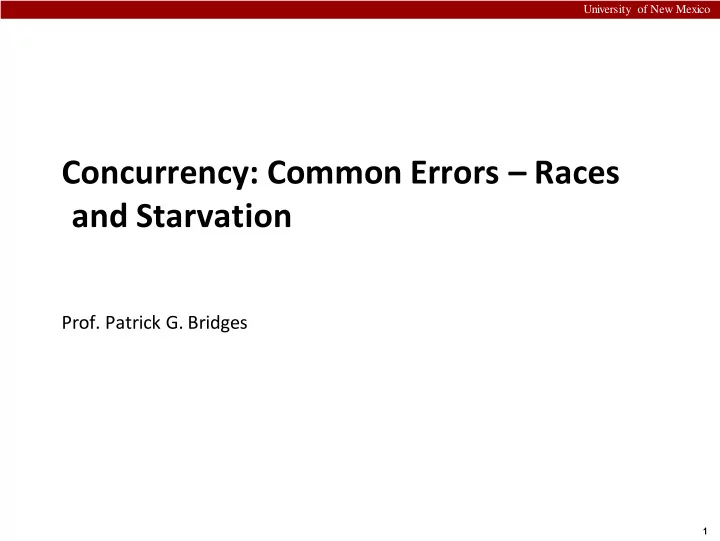

University of New Mexico Concurrency: Common Errors – Races and Starvation Prof. Patrick G. Bridges 1
University of New Mexico Lots of ways to foul up with concurrency Bugs are often unpredictable and hard to reproduce Subtle interactions between multiple actors that are timing dependent Adding debugging code or using the debugger can change the timing, making the bug temporarily hide Need to understand common concurrency problems 1. Critical Section Problems (data races) – we’ve seen this 2. Deadlock 3. Starvation 2
University of New Mexico What Types Of Bugs Exist? Focus on four major open-source applications ▪ MySQL, Apache, Mozilla, OpenOffice. Application What it does Non-Deadlock Deadlock MySQL Database Server 14 9 Apache Web Server 13 4 Mozilla Web Browser 41 16 Open Office Office Suite 6 2 Total 74 31 Bugs In Modern Applications 3
University of New Mexico Non-Deadlock Bugs Make up a majority of concurrency bugs. Two major types of non deadlock bugs: ▪ Atomicity violation ▪ Order violation 4
University of New Mexico Atomicity-Violation Bugs The desired serializability among multiple memory accesses is violated . ▪ Simple Example found in MySQL: ▪ Two different threads access the field proc_info in the struct thd . 1 Thread1:: 2 if(thd->proc_info){ 3 … 4 fputs(thd->proc_info , …); 5 … 6 } 7 8 Thread2:: 9 thd->proc_info = NULL; 5
University of New Mexico Atomicity-Violation Bugs (Cont.) Solution: Simply add locks around the shared-variable references. 1 pthread_mutex_t lock = PTHREAD_MUTEX_INITIALIZER; 2 3 Thread1:: 4 pthread_mutex_lock(&lock); 5 if(thd->proc_info){ 6 … 7 fputs(thd->proc_info , …); 8 … 9 } 10 pthread_mutex_unlock(&lock); 11 12 Thread2:: 13 pthread_mutex_lock(&lock); 14 thd->proc_info = NULL; 15 pthread_mutex_unlock(&lock); 6
University of New Mexico Order-Violation Bugs The desired order between two memory accesses is flipped. ▪ i.e., A should always be executed before B , but the order is not enforced during execution. ▪ Example : ▪ The code in Thread2 seems to assume that the variable mThread has already been initialized (and is not NULL ). 1 Thread1:: 2 void init(){ 3 mThread = PR_CreateThread(mMain , …); 4 } 5 6 Thread2:: 7 void mMain (…){ 8 mState = mThread->State 9 } 7
University of New Mexico Order-Violation Bugs (Cont.) Solution: Enforce ordering using condition variables 1 pthread_mutex_t mtLock = PTHREAD_MUTEX_INITIALIZER; 2 pthread_cond_t mtCond = PTHREAD_COND_INITIALIZER; 3 int mtInit = 0; 4 5 Thread 1:: 6 void init(){ 7 … 8 mThread = PR_CreateThread(mMain ,…); 9 10 // signal that the thread has been created. 11 pthread_mutex_lock(&mtLock); 12 mtInit = 1; 13 pthread_cond_signal(&mtCond); 14 pthread_mutex_unlock(&mtLock); 15 … 16 } 17 18 Thread2:: 19 void mMain (…){ 20 … 8
University of New Mexico Order-Violation Bugs (Cont.) 21 // wait for the thread to be initialized … 22 pthread_mutex_lock(&mtLock); 23 while(mtInit == 0) 24 pthread_cond_wait(&mtCond, &mtLock); 25 pthread_mutex_unlock(&mtLock); 26 27 mState = mThread->State; 28 … 29 } 9
University of New Mexico The Dining Philosophers Assume there are five “philosophers” sitting around a table. ▪ Between each pair of philosophers is a single fork (five total). ▪ The philosophers each have times where they think , and don’t need any forks, and times where they eat . ▪ In order to eat , a philosopher needs two forks, both the one on their left and the one on their right . ▪ The contention for these forks. P1 f2 f1 P2 P0 f3 f0 P3 P4 f4 10
University of New Mexico The Dining Philosophers (Cont.) Key challenge ▪ There is no deadlock . ▪ No philosopher starves and never gets to eat. ▪ Concurrency is high. // helper functions while (1) { think(); int left(int p) { return p; } getforks(); eat(); int right(int p) { putforks(); return (p + 1) % 5; } } Basic loop of each philosopher Helper functions (Downey’s solutions) ▪ Philosopher p wishes to refer to the for on their left → call left(p) . ▪ Philosopher p wishes to refer to the for on their right → call right(p) . 11
University of New Mexico The Dining Philosophers (Cont.) We need some semaphore, one for each fork: sem_t forks[5] . 1 void getforks() { 2 sem_wait(forks[left(p)]); 3 sem_wait(forks[right(p)]); 4 } 5 6 void putforks() { 7 sem_post(forks[left(p)]); 8 sem_post(forks[right(p)]); 9 } The getforks() and putforks() Routines (Broken Solution) ▪ Deadlock occur! ▪ If each philosopher happens to grab the fork on their left before any philosopher can grab the fork on their right. ▪ Each will be stuck holding one fork and waiting for another, forever . 12
University of New Mexico A Solution: Breaking The Dependency Change how forks are acquired. ▪ Let’s assume that philosopher 4 acquire the forks in a different order . 1 void getforks() { 2 if (p == 4) { 3 sem_wait(forks[right(p)]); 4 sem_wait(forks[left(p)]); 5 } else { 6 sem_wait(forks[left(p)]); 7 sem_wait(forks[right(p)]); 8 } 9 } ▪ There is no situation where each philosopher grabs one fork and is stuck waiting for another. The cycle of waiting is broken . 13
Recommend
More recommend